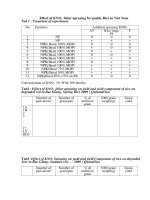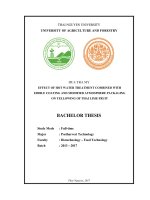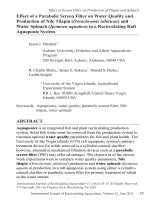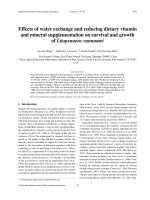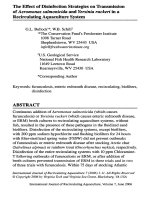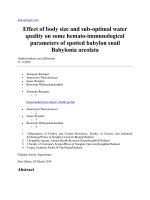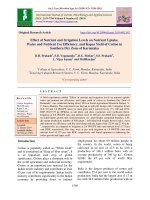Effect of water regime and coloured mulchs on productivity of tomato (Solanum lycopersicon Mill.)
Bạn đang xem bản rút gọn của tài liệu. Xem và tải ngay bản đầy đủ của tài liệu tại đây (89.52 KB, 4 trang )
Int.J.Curr.Microbiol.App.Sci (2017) 6(3): 1827-1830
International Journal of Current Microbiology and Applied Sciences
ISSN: 2319-7706 Volume 6 Number 3 (2017) pp. 1827-1830
Journal homepage:
Original Research Article
/>
Effect of Water Regime and Coloured Mulchs on Productivity
of Tomato (Solanum lycopersicon Mill.)
Harish Kumar*, A.K. Singh and Pramendra Singh
Precision Farming Development center, ARS, SKRAU, Bikaner, India
*Corresponding author
ABSTRACT
Keywords
Tomato, Coloured
mulch, Water
regime and Yield.
Article Info
Accepted:
24 February 2017
Available Online:
10 March 2017
An experiment was conducted at experimental field of
Precision Farming
Development Center, Agricultural Research Center, Swami Keshwanand Rajasthan
Agricultural University, Beechwal, Bikaner during the year 2014-15 and 2015-16. The
experiment was carried out in Completely Randomized Block Design (Factorial) with
three replications. The experiment consist of three water regime viz. 0.6 V, 0.8 V and
1.0 Volume of water through drip irrigation and four treatment of mulch
viz. Black,
silver, Dark red and without mulch . Result revealed that the maximum average yield
per plant and yield per ha. were found under 0.8 V of water whereas no. of fruit per
plant found non significant. Further, maximum no. of fruit per plant, average yield per
plant and yield per ha were found under dark red mulch.
Introduction
Growing water crises and need to produce
more food per drop of water requires water
efficient irrigation method to enhance crop
productivity. Tomato plants are sensitive to
water stress and show high correlation
between evapotranspiration and crop yield.
Under limited water availability, optimal
irrigation management and scheduling are
necessary in order to increase the efficient use
of water for agriculture. Another option is
deficit irrigation: exposing the plant to a
certain level of water stress during a particular
growing period, or throughout the whole
growing season, without significant reduction
in yield. Although, the effects on yield may
be different, many of the research results have
shown that regulated deficit irrigation saves
substantial amounts of irrigation water and
increases water use efficiency (Nuruddin et
al., 2003 and Topcus, et al., 2006). Plastic
mulch is a best option for minimizing the
water requirement as well as increase in yield.
Decoteau (2008) reported that the biomass
accumalation and fruit production affected by
mulch colour and may be due to mulch effects
on the plant light environment and root zone
temperature. Plastic mulches directly impact
the microclimate around the plant by
modifying the radiation budget (absorbitivity
vs. reflectivity) of the surface and decreasing
the soil water loss. The colour of a mulch
largely determines its energy-radiating
behavior and its influence on the
microclimate around a vegetable plant.
Colour affects the surface temperature of the
mulch and the underlying soil temperature.
The degree o f contact between the mulch and
soil, often quantified as a thermal contact
1827
Int.J.Curr.Microbiol.App.Sci (2017) 6(3): 1827-1830
resistance, can affects greatly the performance
of a mulch. If an air space is created between
the plastic mulch and the soil by a rough soil
surface, soil warming can be less effective
than would be expected from a particular
mulch. The present study was undertaken to
evaluate the differernt water regime and
coloured mulch on yield of tomato crop.
Results and Discussion
Materials and Methods
An experiment was conducted in at
experimental field of
Precision Farming
Development Center, Agricultural Research
Center, Swami Keshwanand Rajasthan
Agricultural University, Beechwal, Bikaner
during the year 2014-15 and 2015-16. The
experiment was carried out in Completely
Randomized Block Design (Factorial) with
three replications.
The experiment consist of three water regime
viz. 0.6 V, 0.8 V and 1.0 Volume of water
through drip irrigation and four treatment of
mulch viz. Black, silver, Dark red and without
mulch. One month aged healthy seedlings
were of variety S-600 transplanted at the
spacing of 40 cm x 40 cm and irrigated
through drip irrigation. The recommended
package of practices was followed. Water
requirement determined by PFDC, Bikaner
was used for irrigation scheduling. The
periodical observations on yields were
recorded.
Data from table 2 revealed that the different
water regime non significant effect on number
of fruit during both year and pooled data. The
Significantly higher average fruit yield per
plant (838.95 gm/plant) and yield (507.48
q/ha) was found with 0.8 volume of water
whereas it was minimum under 0.6 volume of
water. Mahmoud et al., (2011) reported that
the application of irrigation at a lower amount
(water deficit) of the water requirement
resulted in lower yield, however, increasing
the irrigation water over a certain level (overirrigation) did not increase the tomato yield
above the maximum yield. Similar findings
were also observed by Singh and Kumar
(2007). It might also be due to avoidance of
surface run off and deep percolation below
the effective root zone under 0.8 V . This
could have increased water application
efficiency. Further, efficiency of water
application depends on the hydraulics of the
moisture advancement pattern under 0.8 V .
Ultimately, higher water use efficiency
because of precise application directly to the
root zone and lower losses due to the reduced
evaporation, runoff, and deep percolation,
reduced fluctuations in the soil-water content
resulting with avoidance of water stress
(Dasberg and Or, 1999), reflected in better
physiological activities of plants and
ultimately increased dry matter accumulation
and there by increased the yield. Such results
were also reported by Raina et al., (1999).
Table.1 Irrigation schedule of tomato
Stage
Initial
Crop development
Mid Season
Last Season
Total
No. of days
35 days
45 days
45 days
25 days
150
1828
Water requirement in (mm)
37.01
83.54
246.29
179.93
546.77
Int.J.Curr.Microbiol.App.Sci (2017) 6(3): 1827-1830
Table.2 Effect of water regime and coloured mulch on production of tomato. (2014-16 Pooled)
Treatment
water
regime
0.6 V
0.8 V
1.0 V
S.Em. ±
C.D. (5%)
Mulch
colour
Black
Silver
Dark Red
Without
mulch
S.Em. ±
C.D. (5%)
Number of fruit/plant
2014- 2015- Pooled
15
16
Average Yield/plant (gm)
2014-15 2015Pooled
16
Yield (q/ha)
2014- 2015- Pooled
15
16
46.64
46.27
46.47
0.52
1.54
39.19
38.79
38.84
0.45
1.31
42.91
42.53
42.66
0.28
0.80
834.10
878.22
866.52
10.14
29.75
759.53
799.68
789.03
5.72
9.23
796.81
838.95
827.78
5.64
15.94
521.31
548.89
541.58
6.34
18.59
442.90
466.06
459.92
5.72
5.33
482.11
507.48
500.75
3.406
9.62
47.56
47.11
51.51
41.60
41.21
45.00
44.58
44.16
48.25
919.30
910.45
995.50
837.06
829.01
906.41
878.18
869.73
950.95
574.56
569.03
622.19
487.63
482.99
527.64
531.10
526.01
574.91
39.66
0.60
1.77
27.95
0.51
1.51
33.807
0.327
0.92
613.20
11.71
34.35
558.51
10.66
31.26
585.854
6.5
18.40
383.25
7.32
21.47
326.93
6.15
18.04
355.091
3.93
11.11
In accordance of different mulches, the dark
red mulch showed maximum number of fruit
(48.25), average fruit yield per plant (950.95
gm/plant) and yield (574.91 q/ha) during both
years and pooled data followed by black
mulch. The increase in yield of mulched
treatment was probably associated with the
conservation of moisture and improved
microclimate both beneath and above the soil
surface and great weed control sp
ecially
under dark red mulch. Similar results found
by singh et al. , 2009. Gough 2001 reported
that the tomato in red mulch set fruit earlier
produced more ripe fruit than plants grown in
black mulch.
References
Dasberg, S., and Or, D. 1999. Drip Irrigation.
Applied Agriculture. springer. Verlag
Berlin, Germany pp-162.
Decoteau, D.M. 2008. The emergence and
early development of coloured
reflective plastic mulch technology in
agriculture. Recent Adv. Agriculture.
Gough, R.E. 2001. Colour of plastic mulch
affects lateral root development but not
root system architecture in paper
,
Hortsci., 36: 66-68.
Mahmoud, A., Wah Allah, Abdullah A. and
Abdullah, A. Ibrahim 2011. Drought
Tolerance of several Tomato genotype
under greenhouse condition. World
App. Sci. J., 15(7): 933-940.
Nuruddin, M.M., Madramootooca and Dodds,
G.T. 2003. Effect of water stress at
different growth stages on green house
tomato yield and quality. Hort. Sci., 38:
1389-1393.
Raina, J.N., Thakur, B.C. and Verma, M.L.
1999. Effect of drip irrigation and
polyethylene mulch on yield, quality
and water use efficiency of tomato.
Indian J. Agri. Sci., 69: 430-433.
Singh R., Kumar S., Nangare D.D. and Meena
M.S. 2009. Drip irrigation and black
polyethelene mulch influence on
growth, yield and water use efficiency
1829
Int.J.Curr.Microbiol.App.Sci (2017) 6(3): 1827-1830
of tomato . African J. Agri. Sci., 4(12):
1427-30
Singh, R. and Kumar, S. 2007. Effect of drip
irrigation and black polyethylene mulch
on growth, yield, water use efficiency
and economics of tomato. Veg. Sci.,
34(2): 177-180.
Topcus, K.C., Das G.Y., Kaman, H., Cetin,
M., Yazia, A. and Bacon, M.A. 2006.
Yield response and N fertilizer recovery
of tomato grown under deficit irrigation.
Eur. J. Agron., 26: 64-70.
How to cite this article:
Harish Kumar, A.K. Singh and Pramendra Singh. 2017. Effect of Water Regime and Coloured
Mulchs on Productivity of Tomato (Solanum lycopersicon Mill.). Int.J.Curr.Microbiol.App.Sci.
6(3): 1827-1830. doi: />
1830
